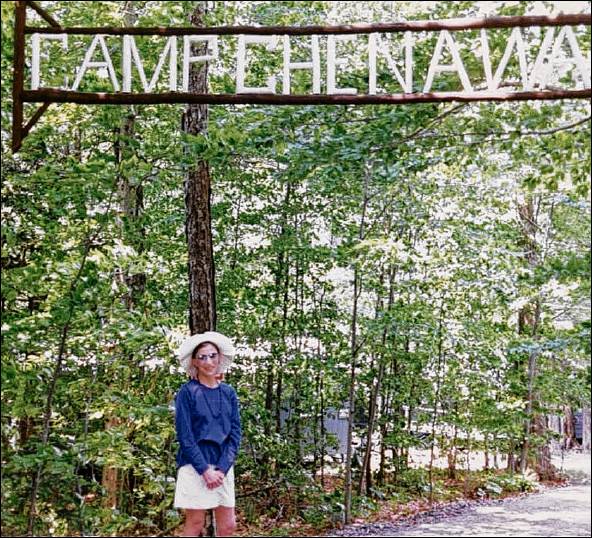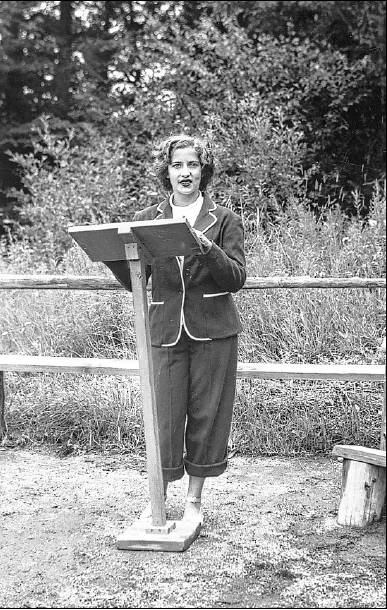ADIRONDACKS
Girls camp Ginsburg’s first chance to be leader
Then known as Kiki, late justice shared in empowerment, sports
By Wendy Liberatore
Minerva
Since Supreme Court Justice Ruth Bader Ginsburg’s death Sept. 18, she has been memorialized as a pioneer on the bench, an advocate for women’s rights, a cultural icon and an opera devotee. But in her youth, she was Kiki, a happy camper.
From 1937 to 1951, Ginsburg spent 7 ½ weeks each summer at Camp Che-Na-Wah, apredominantly Jewish, all-girls camp nestled along the eastern shores of Lake Balfour in the Adirondacks. And there in the Essex County wilds, co-director Barbara Wort-man said Ginsburg cultivated her trademark independence and a sense of duty to the whole.
“She grew up in the city, Brooklyn,” Wortman said. “Going to camp gave her a chance to get out of the city, come up to a beautiful part of the country and learn new activities. It opened her eyes to a whole new world.”
As she grew as a camper, first arriving as a fledgling 4-year-old and faithfully returning until she was 18, Ginsburg excelled in watersports, mainly swimming and water skiing, as well as riding horses and dabbling in arts and crafts. Ginsburg was known by her nickname given to her by her sister who said Ginsburg kicked a lot as a baby.
Wortman’s mother-in-law, Ruth Wortman, was Ginsburg’s swim counselor at Che-Na-Wah. She remembers swimming across the lake with Ginsburg, something campers are no longer allowed to do. Now at 91 and living in an assisted living facility in Yonkers, her memories fade in and out. But she still remembers the day she met Ginsburg. Ruth Wortman, then going by her maiden name Lowenfish, was 16. Ginsburg was
12.
“I met this little girl at the lake and she was beautiful,” Ruth Wortman said. “She was a good swimmer, too.”
Her then counselor recalls her as “very friendly, wonderful.”
“She was involved with all the activities,” Ruth Wortman said. “I’m so proud to know her.”
Ginsburg, who died at age 87, hit her camp stride in 1948 at age 15. For one week, she was designated as “camper rabbi” and offered the sermon at Saturday morning’s Shabbat service. No one seems to remember on what topic she spoke, but the outdoor podium where she stood remains today where each week another girl is chosen for the role.
That was around that same time, Barbara Wort-man said, Ginsburg’s mother was diagnosed with cancer and Che-Na-Wah became a refuge.
“She was able to get away from that for a little bit,” Barbara Wortman said. “She had friends here.”
Ginsburg’s connection to Che-Na-Wah starts with her uncle and aunt, Chuck and Cornel Amster, who built the camp in 1923. Chuck Amster, brother to Ginsburg’s mother, sought to find a place where his children could explore nature, live collectively and excel independently. Ginsburg joined in with her cousins at Che-Na-Wah and its neighboring Camp Baco for boys, until she was 18 when she became a camp counselor.
In 1954, the year Ginsburg graduated from Cornell University, Ruth Wortman and her husband, Mel, became partners with the Amsters at Baco. When Ginsburg’s Aunt Cornel, known as Mother Cornel, died, the Wortmans assumed ownership of the boys camp. The Wortmans’ son, Bob, and his wife, Barbara, bought the camp in 1976.
Former Che-Na-Wah camper and counselor Alice Sternin and her husband, Lester, partnered with the Amsters on the girls camp in 1959, the year that Ginsburg became a law clerk in U.S. District Court, in the Southern District of New York. The Sternins took full ownership of the girls camp in 1961.
Ronnie Silver, Sternin’s daughter, said that her mother always remembered Ginsburg fondly and was proud that “Kiki was a Che-Na-Wah girl.”
“The philosophy of the camp was women can do anything,” Silver said. “So much of the Justice was instilled at camp. It was always taught to us that there is nothing girls couldn’t do. Camp empowered us and for someone extremely bright and curious, that was important.”
The Sternins sold Che-Na-Wah to the Wortmans in 1986. With the death of Bob Wortman in 2018, Barbara Wortman and her daughter, Allison, carry on the family tradition as co-directors of both camps.
Throughout those years of transition at the camp, Ginsburg was a rising star. According to a CNN time-line, she was, among other things, a professor of law at Rutgers and Columbia University schools of law, a general counsel for the ACLU and a judge with the U.S. Court of Appeals for the District of Columbia. In 1993, she was nominated by then President Bill Clinton and sworn in as a Supreme Court justice.
Despite her fame — and in recent years known to young fans as the Notorious RBG — she never forgot the years she spent at Che-Na-Wah. Barbara Wortman said Ginsburg, who could instantly recall the camp song, remained in touch over the years, including a 1995 visit with her family.
“She wanted her family to see the camp,” Wort-man said. “She never sent her children here, but she had great memories of the camp.”
“The philosophy of the camp was women can do anything. So much of the Justice was instilled at camp. It was always taught to us that there is nothing girls couldn’t do. Camp empowered us and for someone extremely bright and curious, that was important.”
— Ronnie Silver
Ginsburg made a virtual appearance at Che-Na-Wah in 2015 at the start of the camp’s Blue and Gold competition, a time when campers are divided into teams to compete in various sports. She told the auditorium of campers to “Give the game and contests your all. And remember throughout, whether Blue or Gold, friends, friends, friends we will always be.”
“That same summer was the Supreme Court decision on gay marriage,” Barbara Wortman said. “Even with everything going on, she found the time to do that for us.”
“Che-Na-Wah also appeared in the Hollywood adaptation of her life. In a scene in “On the Basis of Sex,” ACLU legal director Melvin Wulff greets Ginsburg with a camp song.
Regardless of all of Ginsburg’s accolades, Barbara Wortman’s most vivid impression of Ginsburg is as a soft-spoken woman.
“That was one of the most impressive things,” Barbara Wortman said. “She thought about her words before she said them.”
Ruth Wortman, who called her Kiki to the end, sporadically corresponded with Ginsburg and recently exchanged emails last March. In the email, Ginsburg recalled how Ruth Wortman guided her to Kauser’s Rock and then across the lake. She ended her email with “Thanks for the memories, and every good wish, Kiki.”
“Even though they haven’t been in touch a lot, I thought (Ginsburg’s) email was sweet,” said Ruth Wortman’s son, Jerry Wortman. “She was so busy, but she took the time to write my mother.”
Though the Wortmans understand that Che-Na-Wah gave much to Ginsburg, her legacy at the camp continues to inspire all the girls who spend summers there.
“She has contributed an enormous amount to our campers, in particular, the girls,” Barbara Wortman said. “Since her confirmation, we have always talked about her at camp, making sure that they know that there are women role models that they can emulate. They found it amazing that they were walking the same grounds as she did, and that someday it was possible that they, too, would be able to reach their goals if they worked hard enough.”
Ginsburg made a virtual appearance at Che-Na-Wah in 2015 at the start of the camp’s Blue and Gold competition, a time when campers are divided into teams to compete in various sports. She told the auditorium of campers to “Give the game and contests your all. And remember throughout, whether Blue or Gold, friends, friends, friends we will always be.”

